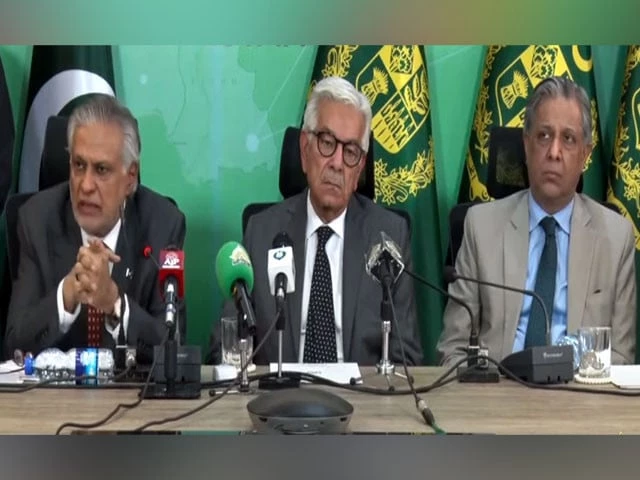Dar rejects 'baseless' allegations over Pahalgam attack, demands evidence from India
No external help needed to respond aggression, India will be given befitting response: DPM Ishaq Dar

Deputy Prime Minister and Foreign Minister Ishaq Dar on Thursday warned that Islamabad could withdraw from the Simla Agreement and other bilateral treaties if India unilaterally revokes the Indus Waters Treaty, amid escalating diplomatic tensions.
At a joint press conference with senior cabinet members, he said, “If India terminates the Indus Waters Treaty, Pakistan will consider scrapping the Simla Agreement and other accords. We don’t need external help to respond to aggression, India will be given a befitting response.”
Dar rejected Indian allegations of cross-border terrorism as “baseless blame games,” urging India to present evidence if it has any.
He stated that Pakistan has identified the arrival of “foreign nationals” in Srinagar who are under surveillance by intelligence agencies. He alleged that Indian intelligence was backing these individuals, who were reportedly attempting to smuggle improvised explosive devices (IEDs).
“You can imagine their intended destination,” Dar remarked, stressing that Pakistan’s armed forces are fully prepared to counter any threat.
He also confirmed the immediate closure of the Wagah border and announced that the Indian High Commission staff in Islamabad will be reduced to 30 by April 30. In addition, India's defence, air, and naval attachés have been declared persona non grata and ordered to leave Pakistan.
Quoting former US President Bill Clinton’s reference to Indian terrorism, Dar highlighted India’s history of regional aggression. He also cancelled his upcoming visits to Bangladesh and Kabul to deal with the unfolding situation.
“India cannot stop water for 240 million Pakistanis,” Dar said. “If it attempts to do so, it will be treated as an act of war.” He added that Pakistan is prepared for any scenario and would notify the World Bank, a guarantor of the Indus Waters Treaty, of India’s actions.
On border tensions, Dar cautioned against interpreting minor violations as security failures, given the 2,000-kilometre stretch. He reiterated Pakistan’s commitment to preventing the use of its territory for cross-border operations.
“If India attacks, we will respond in kind,” Dar said, adding that while Pakistan is ready to consult its allies, it needs no external assistance to defend itself. “If anyone tries an adventure, the consequences could be worse than before.”
He noted that India’s formal demarche to the Pakistani envoy did not mention suspension of the Indus Waters Treaty, despite Indian cabinet statements suggesting otherwise. “It appears there may be a disconnect between the Indian government and its foreign ministry,” Dar remarked.
The press briefing followed a meeting of Pakistan’s National Security Committee (NSC), where civil and military leadership approved a range of countermeasures to what it described as India’s “aggressive unilateralism.”
As part of the measures, Pakistan announced the closure of its airspace to Indian commercial flights and ordered the expulsion of Indian defence, air, and naval attachés. The Indian High Commission in Islamabad will have its staff reduced to 30 members, effective April 30.
Pakistan has also closed the Wagah border and issued 48-hour departure notices to Indian nationals in the country, with the exception of Sikh pilgrims, whose travel remains unaffected.
Meanwhile, Defence Minister Khawaja Asif accused India of repeatedly conducting 'false-flag operations' to justify allegations against Pakistan, citing the recent incident in Pahalgam as another example.
“Despite the Indian media’s attempts to implicate Pakistan, the Indian government has not officially named us in connection with the Pahalgam attack,” Asif said during a joint press conference with senior government officials on Thursday.
Taking a swipe at Indian Prime Minister Narendra Modi, Asif stated, “To date, no US administration has ever barred a prime minister from entry by labelling him a terrorist. Modi is a certified terrorist who oversaw the massacre of Muslims in Gujarat while serving as chief minister.”
The defence minister also questioned how such an attack could occur under the watch of Indian security forces in heavily militarised Kashmir. “The incident raises serious questions about the effectiveness of Indian forces,” he said.
He drew a parallel with the 2019 Pulwama incident, suggesting it was also staged. “India has a history of orchestrating attacks to shift blame onto Pakistan,” he said, adding, “Despite our political differences at home, the nation stands united against Indian aggression.”
Information Minister Attaullah Tarar criticised India’s rhetoric as “juvenile posturing” and warned that the airspace ban would financially impact Indian airlines. “This is more than talk, we’ve taken action,” Tarar said.
An official from Pakistan’s Indus Waters Treaty Commission noted that the treaty cannot be suspended unilaterally. “Even during two wars, the treaty endured. It remains in effect unless both nations jointly dissolve it,” the official said.
Pakistan has notified the World Bank, which is a guarantor of the treaty, and is considering additional diplomatic avenues should India proceed with the suspension.



1724319076-0/Untitled-design-(5)1724319076-0-208x130.webp)















COMMENTS
Comments are moderated and generally will be posted if they are on-topic and not abusive.
For more information, please see our Comments FAQ